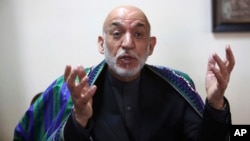Former Afghan President, Hamid Karzai is continuing his criticism of the new U.S. strategy for Afghanistan, asserting it does not bring “a message of peace” but instead increases war and fuels regional rivalries over his strife-torn country.
Addressing a news conference in Kabul, Karzai disclosed he has written a formal letter to President Ashraf Ghani, urging him to convene an emergency traditional grand assembly of elders, or Loya Jirga, for discussing Trump’s war plan and finding a way out of the conflict. The jirga meeting is needed to prevent Afghanistan from again “becoming victim of rivalries between big powers,” insisted the former president.
Karzai added he also has written a letter to the Taliban calling on the insurgent group to attend the meeting to help find a politically negotiated settlement to the Afghan war.
“America’s new strategy for Afghanistan does not bring us a message of peace but a message of more hostilities and increases regional rivalries,” said Karzai, who himself is being accused of stoking rivalries between Russia and the U.S. by issuing such statements.
Washington supported and installed Karzai as the head of the government in Kabul after a U.S.-led foreign military coalition ousted the Taliban from power in 2001 for sheltering al-Qaida. He went on to rule Afghanistan until 2013, and he developed deep differences with his U.S. allies on a variety of issues toward the end of his long rule.
The former president remained under fire for his inconsistent polices, a lack of key reforms and for not taking steps to stop rampant corruption in state institutions while the U.S. spent hundreds of billions of dollars on Afghan security and reconstruction projects.
Karzai said the regional cooperation Kabul and the United States were receiving until a few years ago in their efforts to stabilize Afghanistan has diminished and instead turned into a rivalry. He apparently was referring to increasing contacts Russia and Iran have established with the Taliban while the insurgent group continues to use alleged sanctuaries in Pakistan.
“No I am not,” Karzai replied when asked about allegations he was fueling conflict between major powers.
“I am trying to bring a balance back in Afghanistan. I am trying to create an environment of cooperation between the big powers in Afghanistan and the neighbors because that is what we need exactly, and very much badly in our country,” he insisted.
Karzai has been among a few prominent Afghans who have opposed from the outset President Trump’s strategy that he outlined in August. The plan allowed a modest U.S. troop surge and stepped up airpower to help Afghan security forces break the military stalemate with the Taliban.
President Ghani’s National Unity Government and many Afghans in general have welcome the new U.S. plan, hoping it will enable Afghan forces to reverse Taliban gains and pave the ground for a peaceful settlement to the Afghan war.
Ghani’s spokesman, Shah Hussain Murtazawi, dismissed Karzai’s assertions, saying the Afghan government is moving in the right direction to ensure security of its citizens.
“America’s new strategy is for permanent peace and stability in the region and is based on views of the [Afghan] people and the government [of Afghanistan]. Foreign forces are only advising and training Afghan forces who are leading and themselves conducting security operations,” Murtazawi noted.
U.S. officials so far have not responded to Karzai’s allegations.
Karzai also questioned the emergence of Islamic State in Afghanistan in the last few years, citing the development for Moscow and other nations, including Tehran, to engage with the Taliban in order to keep the Syria-based terrorist group from threatening their territorial boundaries using “ungoverned” Afghan spaces.
“It is for the last four years, five years that they [Russia and other nations] have taken a different attitude because of the emergence of Daesh, because of the emergence of those other radical groups. They are wondering why? How come? Because the U.S. presence here was supposed to end extremism not to add to extremism,” lamented the former Afghan leader.
Russian and Iranian officials have acknowledged maintaining contacts with the Taliban, which controls or contests more than 40 percent of Afghan territory. Moscow, Islamabad and Tehran have expressed concerns that the continuation of hostilities, particularly in Afghan border regions, will create security challenges for them.




